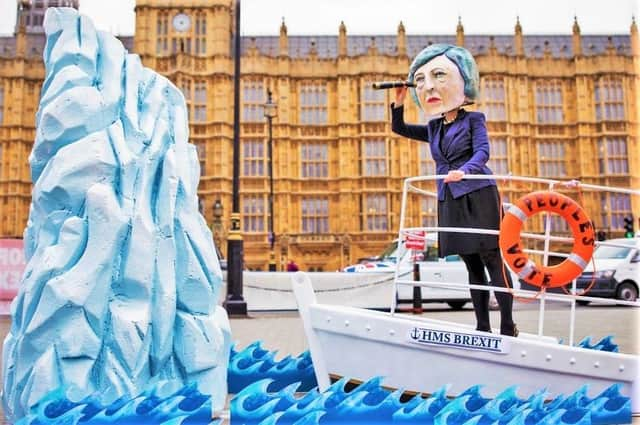Owen Polley: Time we busted some myths about Brexit and unionism


Let’s look at some of the most popular and persistent.
First, many people claimed again that an Irish Sea border became inevitable when the UK decided to leave the EU. They said that the protocol is the fault of Brexit supporters, including unionists (like the DUP) who voted for it. Pro-Union leavers should therefore ‘own’ the consequences of their decision and stop complaining.
One problem with this logic is that the Republic’s government, under the then-taoiseach Enda Kenny, did not think that a sea border was inevitable in the months following the referendum.
Advertisement
Hide AdAdvertisement
Hide AdIn fact, Dublin officials began exploring how checks could take place on the land frontier between Northern Ireland and the south.
They assumed, quite logically, that any hardening of the border would have to reflect an existing international boundary that had been established for over a century. It is the fact that this did not happen that is extraordinary and unprecedented.
More importantly, from a political and moral perspective, unionists had every right to campaign for Brexit, without fear that Northern Ireland would subsequently be wrenched out of important aspects of the Union.
Their place in the United Kingdom relies on the ‘principle of consent’, which is supposed to be a central tenet of the Belfast Agreement. And if that principle means anything at all, voters in Northern Ireland would expect to take part in a nationwide referendum and have its outcome applied here on the same terms as voters elsewhere in the UK.
Advertisement
Hide AdAdvertisement
Hide AdYou can understand why nationalist parties, that have never convincingly accepted that the principle of consent has consequences, would not grasp this argument. It is more disturbing when some self-declared unionists seem to share their outlook.
During the EU referendum, pro-Union people took part in both the ‘remain’ and ‘leave’ campaigns. Afterwards, perfectly reasonably, they took different views about what kind of Brexit the UK should pursue.
The one point of consensus should have been that any outcome must be UK wide and include Northern Ireland fully.
Another piece of received wisdom, repeated constantly, is that the DUP insisted on a ‘hard Brexit’ and rejected every proposal that would have resulted in a ‘softer’ outcome.
Advertisement
Hide AdAdvertisement
Hide AdThis is connected to the even more inaccurate claim that Theresa May’s ‘backstop’ deal would have prevented economic barriers between Great Britain and Northern Ireland.
Admittedly, the DUP’s performance, in the wake of 2016, has been distinctly unimpressive.
It spurned the chance to play a constructive role in the UK government after the 2017 election, preferring to boast that it had secured £1 billion in funding. It endorsed the ‘joint report’ of December 2017 that entrenched Theresa May’s ‘backstop’, after initially insisting on ineffective changes.
And it eventually agreed to a regulatory border in the Irish Sea, before Boris Johnson signed his protocol.
Advertisement
Hide AdAdvertisement
Hide AdHowever, despite the impression given by MPs like Ian Paisley and Sammy Wilson, the DUP did not insist on a ‘hard Brexit’. The party’s only ‘red line’ was that any deal should treat Northern Ireland the same as the rest of the UK.
Its Westminster leader at the time, Nigel Dodds, told the BBC’s Newsnight programme that, given a choice between protecting the Union and delivering Brexit, the DUP would choose the Union.
The party rejected Theresa May’s Withdrawal Agreement because it treated Northern Ireland differently. Yes, the former prime minister’s aim was to keep the whole UK tied closely to the EU’s single market and customs union which, in the short term, may have prevented disruption to GB-NI trade.
But the whole point of the ‘backstop’ was that if the rest of the UK diverged from Brussels’ rules, Northern Ireland would remain tied to the single market and customs union. May was committed to a close relationship with the EU, but her government was hanging by a thread.
Advertisement
Hide AdAdvertisement
Hide AdHer agreement was likely to create every problem subsequently entrenched by the Protocol, as soon as a more eurosceptic administration took power in Westminster.
In addition, it removed Northern Ireland officially from the UK’s customs regime and tied it to the EU set-up instead.
For the casual observer, a lot of this detail was easy to miss. Consistently, the Westminster government played down problems involved in the withdrawal agreements championed first by Theresa May and then by Boris Johnson.
It’s understandable that the DUP’s opponents, and particularly its unionist rivals, want to point out the party’s failures.
Advertisement
Hide AdAdvertisement
Hide AdOn the pro-Union side, though, they should be careful to ensure that their criticisms are well-aimed and accurate.
There is every danger that, otherwise, they might end up strengthening profoundly anti-unionist arguments and bolstering the position of those who are using Brexit as an excuse to weaken the Union.
– Ben Lowry returns next week
More from the News Letter:
——— ———
A message from the Editor:
Advertisement
Hide AdAdvertisement
Hide AdThank you for reading this story on our website. While I have your attention, I also have an important request to make of you.
With the coronavirus lockdowns having had a major impact on many of our advertisers — and consequently the revenue we receive — we are more reliant than ever on you taking out a digital subscription.
Subscribe to newsletter.co.uk and enjoy unlimited access to the best Northern Ireland and UK news and information online and on our app. With a digital subscription, you can read more than 5 articles, see fewer ads, enjoy faster load times, and get access to exclusive newsletters and content.
Visit
now to sign up.
Our journalism costs money and we rely on advertising, print and digital revenues to help to support them. By supporting us, we are able to support you in providing trusted, fact-checked content for this website.
Ben Lowry, Editor